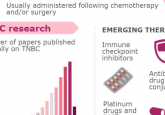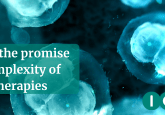ESMO16: Pembrolizumab shows therapeutic potential in non-small-cell lung cancer

A study presented recently at the ESMO 2016 congress in Copenhagen highlights the therapeutic potential of the PD-1 antibody, pembrolizumab, for improving response rates and survival in the treatment of non-small-cell lung cancer patients undergoing first-line chemotherapy.
Pembrolizumab is a check point inhibitor which reactivates T cells allowing them to promote tumor cell death. In this Phase II KEYNOTE-021 study, researchers looked at the effects of this immunotherapy drug when used in combination with the chemotherapy agents carboplatin and pemetrexed.
Overall, 123 patients with stage IIIB/IV, chemotherapy-naïve, nonsquamous non-small cell lung cancer were randomly assigned to one of two treatments groups: four cycles of carboplatin and pemetrexed (500 mg/m2 every 3 weeks) with or without a 24-month course of pembrolizumab (200 mg every 3 weeks).
Results demonstrated a significantly higher response rate in patients who were treated with the combination therapy compared with those treated with chemotherapy alone at a 10.6 (median) month follow-up. In addition they discovered a higher response rate (approximately 80%) for patients receiving the combination therapy in tumors with PD-L1 expression of 50% or above.
Patients in the pembrolizumab and chemotherapy treatment group were also found to exhibit improved progression-free survival (median 13.0 months vs. 8.9 months), although overall survival rates were similar.
“Notably, the progression-free survival reported in the standard arm was much longer than expected and nearly doubled when compared to historical data, which could be due to patient selection or other clinical/molecular characteristics of the patients enrolled in this study,” commented Raffaele Califano (The Christie Hospital and University Hospital of South Manchester, UK).
Patients in the combination treatment group did however report a greater incidence of adverse events (grade 3 severity) compared to the chemotherapy alone treatment group (39% vs 26%) – the most common of these being fatigue and nausea. Despite this, this factor did not appear to have any influence on the treatment discontinuation rates or the treatment-related deaths.
“Data for the combination of chemotherapy plus pembrolizumab in this population is certainly encouraging, and it is reassuring to see that the addition of pembrolizumab to first-line chemotherapy has a manageable toxicity profile and doesn’t increase the incidence of treatment-related adverse events or deaths,” noted Califano. “In order to establish if this strategy should be adopted in clinical practice, these results should be investigated further in a Phase III randomized study with a similar design, adequately powered for progression-free survival and with robust assessment of patient’s reported outcomes.”
Source: ESMO press release





